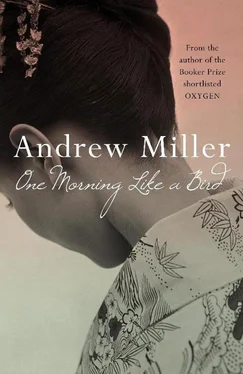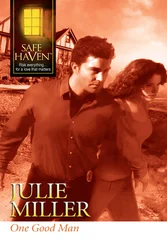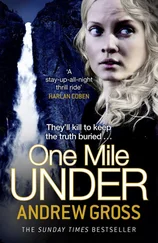‘Shall we be able to do this next year?’ asks Feneon, swirling the last of his brandy and letting his gaze rest on Alissa, on Emile.
‘We are doing it this year,’ says Miss Ogilvy. ‘And that is what matters. A grandfather should be wise enough to know that.’
At bedtime — whatever time that is, three, four o’clock — Yuji has a mattress in the room where he waited the night Emile was born. (‘You,’ Miss Ogilvy informed him simply, ‘are in the tower. You know where to go.’) He lies there, slightly drunk, wondering if Alissa is upstairs listening for his footsteps or if, with the baby beside her, she is already fast asleep. What is he to her now? What is he supposed to be? Do the others all assume something? If they do, he wishes someone would tell him what it is. As for what he wants. . He peers into the speckled dark of the room, moves his life around like the pieces of a puzzle, but just as the suspicion starts to grow in him that a life, his or anyone’s, is not a puzzle at all but something quite different, something that does not admit of solutions, he is lying on his arm softly snoring and dreaming of Mother singing in a voice thin as wire, ‘ Schlaf in Himmlischer Ruh, schlafe in Himmlischer Ruh .’
At mid-morning the house downstairs is deserted. Yuji takes a walk. He does not need his stick now. His knee has healed and the burns are no more than patches of raw new skin. When he comes back, he finds Sandrine and Mary turning the billiard table into a dining table. He helps them lift the heavy wooden lid, spread the spotless linen. The cats leap up, are chased off before they leave a trail of prints. In the kitchen, in swirls of steam, Miss Ogilvy, with two of the girls, is preparing dinner. (‘You can’t ask a Chinese to cook a Christmas dinner.’) There is a roast duck, trays of sweet potatoes, a great saucepan of red cabbage. The pudding is a ball wrapped in muslin. Apparently it has to boil for hours.
It is dark again before everything is ready, the table set, the girls in their best clothes, the wine decanted. Miss Ogilvy takes photographs with her Leica and flashgun. Everyone together, then the girls in various demure poses by the mantelpiece. ‘Now,’ she says, ‘the new family.’ A chair is put out for Alissa and Emile. Yuji stands beside them. When Feneon is urged to join them he says he will, gladly, but first it should be just mother, father, son.
‘As you wish,’ says Miss Ogilvy, screwing a fresh bulb into the flashgun.
The baby is restless. Alissa settles him with a touch, then smiles up nervously at Yuji.
‘At the camera, please!’ calls Miss Ogilvy.
They turn to her, compose themselves. She lifts the gun. The light, white and chemical blue, is blinding, and for an instant it prints their shadows thickly on the far wall.
New Year is spent with Grandfather. Yuji travels to Setagaya with Miyo. Mr Fujitomi is there. He has brought his wife and sister with him. After eating, they go by taxi to a shrine next to the railway station, a small place compared with the one in Hongo, old, unfashionable. They take Grandfather’s wheelchair. Yuji pushes it. How heavy the old man is, a dead weight, a dragging, dead weight.
Chief Priest Takashita comes out to welcome Grandfather personally. He presents him with a scroll on which a snake is drawn beside certain verses from The Chronicle of Ancient Matters petitioning good health.
They don’t stay for long. Grandfather looks at Sonoko, who looks at Yuji, who turns the chair round. The taxi is waiting for them, the driver flicking through a magazine of fortune-telling.
At the house, the Fujitomis remain for a last flask of sake. Yuji sits with his secrets. Even Mr Fujitomi seems distracted. Has he heard anything from China? How long since the last letter? Grandfather is growling. His lower lip droops, trembles. When Sonoko does not immediately translate for him, he tries to slap her leg.
‘He says,’ she says, ‘Japan is finished.’
The others look politely interested. All day and all night the streets have been full of a fine white mist.
As soon as the holidays are over and the academy is open for business again, Alissa moves back to the house in Kanda. It is easier now, much easier for Yuji to visit. He can go for an hour in the morning, then meet Fujitomi in the Low City before returning to the house for another hour in the evening. He is pleased, yet he also understands that the move’s indiscretion, its indifference to local scandal, means the hour of separation is not far away.
On the evening of 15 January, the day families gather to eat New Year gruel, he crosses the garden through a cold west wind to find Alissa and Emile asleep on the sofa in the salon. Feneon is sitting with his back to the stove, the dog on his lap, a newspaper spread across the table in front of him. He greets Yuji with a nod, and after folding away the paper, he fetches his chessboard from the study. In silence they make their opening moves, exchange pawns, clear the lines for more powerful pieces to enter the fray. It’s Feneon’s turn. After studying the board for a minute, he looks up at Yuji and says, ‘I hope I can trust you to be discreet?’
A few months ago and the question would have felt slighting. Yuji would have brooded on it. Now it is merely part of the new honesty between them, the new froideur .
‘I shall be leaving soon for Singapore. The British have a large garrison on the island and there’s an English planter there, a man called Farrell, who I was able to help with some trouble in Saigon. He will, he assures me, now repay the favour. As soon as I have found a suitable house, I will send for Alissa and Emile. It should only be a matter of a few weeks, perhaps a month, but during that time they will be entirely in your care.’
There is no mention, no hint of the possibility of Yuji accompanying them. Is this how Feneon will free his daughter from her unfortunate connection? Or is it simply that Feneon, a practical man, understands as well as Yuji the impossibility of it? How, in better times, in Taisho times, a person like Professor Takano might go abroad, might even live there a season or two while he studied its ways, but now, for any young man — even one with a Class F exemption — to leave these islands without khaki on his back would be tantamount to desertion? He could never come home. He would have no home to come to.
‘I will care for them,’ says Yuji, quietly.
‘Thank you,’ says Feneon, using his bishop to knock over Yuji’s knight. ‘That’s settled, then.’
The luggage — four trunks of battered tin, each with the markings of earlier journeys, the smudged chalk of a cabin number, a pasted-on, half-torn-off address in Bombay, Macau, Cholon — is sent to the Bullseye Academy and then, the day before the sailing, down to the docks to be loaded onto the San Cristobal da Lisboa . The San Cristobal is bound for Shanghai. From there a second ship will take Feneon to Hong Kong, where a steamer of the Peninsular and Oriental Company will complete the journey to Singapore.
Alissa, Emile and Feneon have accompanied the trunks to the academy. Yuji joins them the morning of Feneon’s departure. The weather, turbulent all week, has settled again and a phone call to the agents confirms the ship will sail at the appointed hour of three in the afternoon. They decide on an early lunch, but as soon as they sit down Alissa begins to weep like a child. She tries but cannot stop herself. Feneon takes her outside, returns five minutes later holding her hand. At the table, he tells tales of shipboard encounters, the Irish priest he once shared a cabin with on a crossing of the Arabian Sea, the Romanian countess who travelled with a wolf cub. Miss Ogilvy accuses him of invention, of being little better than a novelist, a romancier , but she has laughed along with the others.
Читать дальше












